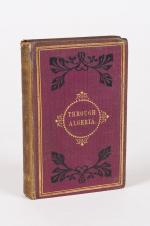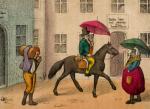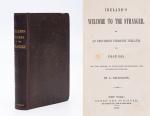39. Barwise, Lucy Weston / [Lucy Chapman, George Chapman, Henry Chapman]
Manuscript Autobiography, Diary and vintage photo album of the Chapman – Barwise Family. A cultured London woman’s autobiography and diary including a first hand account of ‘Fiesche’s attempt to assassinate Louis Phillippe’ which she observed while at school in Paris as a child. The manuscript has a mournful postscript by the man she left behind, her husband: ‘Alas! that I George Chapman should have to finish the record of so dear a Life…’ by Lucy Weston Barwise (1822-1876) wrote in a lockable, lined octavo notebook, crushed morocco, marbled endpapers and edges. Her autobiography was begun in January 1872 at one end of the book (16 pages); her diary appears at the other end of the book from October 22 1871-April 1874 with her husband’s postscript dating from June 1880. There is a second volume of family accounts in a lockable octavo sized ledger and a folio sized volume of family photographs, most unlabelled. Barwise’s autobiography recounts her education in Paris in the Rue Taitbout where she witnessed ‘Fiesche’s attempt to assassinate Louis Phillippe’ while watching from her music master’s house opposite the Porte St Martin, noting ‘the Duc D’Orleans [who] looked very handsome’ but shortly afterwards ‘heard a loud report and then a shout… general commotion but the crowd was so thick and immoveable’ and then ‘the King and stiff rode slowly back along the line but looking very white.’ It was only later that she discovered the casualties of ‘Fieschi’s infernal machine… It was a row of gun barrels arranged along a window so as to be discharged all at once.’ Barwise also watched the subsequent funeral from her attic window, the ‘open hearse with its draperies of black and silver’. The highlight of Chapman’s diary is a detailed account of the deaths she witnessed during the ‘Thanksgiving Day for the recovery of the Prince of Wales’ on February 27th, 1872, as seen from her husband George Chapman’s ‘office windows in Cockspur St’ behind Trafalgar Square which overlooked the procession. There she witnessed the lack of barriers and observes with horror the police charging into the surging crowd ‘The big policemen threw themselves against the men; the horses even made to dance and back heel it was a fearful struggle’with a baby almost crushed to death in front of her. There is an interesting secondhand account of Paris under the Commune via one of her daughters and frequent visits to London art exhibitions as on July 8 1871 where she saw an ‘exhibition of old masters at the Royal Academy… Crome, Ruysdael, heads by Moroni, of Titian’s Schoolmaster, Burgomaster by Rembrandt… the two heads.. by Giorgine belonging to Lord Ashburton, such colour and such expression. There are trips to Ascot and the Boat Race, a curry with friends in Wandsworth and a recitation by ‘Mr Bradman [of] the Merchant of Venice for the benefit of the Workman’s Club. It was very clever… Shylock was good but my recollection of actors, Charles Kemble, C.Kean &c made this more familiar and perhaps a little more like ranting’.
[London], c. 1871 – 1872. Octavo. Diary I: 44 pages / Diary II: 24 pages / Photoalbum: 48 pages with 120 original cabinet photographs (including a photograph of a british Forest School). Hardcover / Original full leather. All three Volumes slightly rubbed but all in very good condition. The cabinet photographs all in excellent condition and from dozens of different victorian photographers in Bath (Friese Greene), Bonn (Emil Koch), Astley (Photograpic Landscape Artist in Astley, Essex), and many others. The one diary is really a cash ledger of George Chapman where he kept track for the Chapman family with listings of expenses for Hampstead House, Henry Chapman, Edward Chapman, Oswald D. Chapman, Mrs. Barrett Chapman, Edith Louisa Chapman.






![[Byron Circle] Haygarth, Greece, A Poem, In Three Parts - with 9 Sepia Aquatints - First Edition - 1814](/images/thumbnails/31707AB.jpg)

![[Saadi of Shiraz] Sa'di / Abu-Muhammad Muslih al-Din bin Abdallah Shirazi. Golestan [Gulistan / Rose Garden]](/images/thumbnails/101531AB.jpg)





![[Tasso, Jerusalem Delivered; an Heroic Poem. [Large / Illustrated / Better Paper Edition].](/images/thumbnails/29355AB.jpg)





